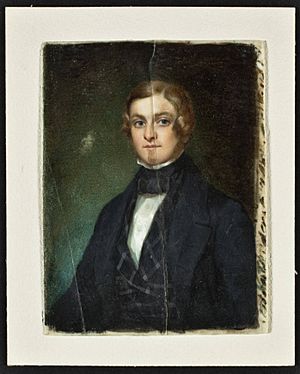George Ruxton facts for kids
George Frederick Ruxton (born July 24, 1821 – died August 29, 1848) was a British explorer and travel writer. He was a soldier in the British Army and even received a special medal for bravery from Queen Isabella II of Spain. Ruxton was also a skilled hunter and explorer. He wrote many articles and books about his exciting trips to places like Africa, Canada, Mexico, and the United States.
He saw firsthand how the United States was growing westward in the 1840s. This was a time when the country was following a policy called Manifest Destiny, which meant they believed it was their right to expand across the continent. Ruxton was also the first writer to share a lot of information about the "mountain men" who lived in the Rocky Mountains.
Contents
Early Life and Adventure
George Frederick Augustus Ruxton was born near Oxfordshire, England, to Anna Maria Hay Ruxton and John Ruxton. Even from a young age, he loved adventure. He once said, "I was a vagabond in all my propensities." This means he loved to wander and explore. He didn't like anything quiet or ordinary. He wanted to see the world and experience new and exciting, even dangerous, things. He started his education at the Royal Military Academy Sandhurst but left early because he was so eager for adventure.
Bravery in Spain
When he was just 17, Ruxton became a soldier during a civil war in Spain (1833–1839). He was a lancer, a type of soldier who uses a long spear. He showed great bravery in a battle at Belascoáin and was awarded the Laureate Cross of Saint Ferdinand by Queen Isabella II. This was a very important medal for his courage.
Exploring North America
After his time in Spain, Ruxton served as a soldier in Canada. He became very interested in the lives of the Native Americans and the trappers who lived on the wide-open prairies. Because he was so fascinated, Ruxton decided to leave the British Army. He then became a hunter in Upper Canada, exploring the wilderness.
Journey to Africa
Ruxton later returned to England, but his desire to explore didn't stop. He sailed from Liverpool, hoping to explore central Africa. However, he couldn't find the information or resources he needed to explore as he wished. So, he returned to England. Even though his trip wasn't successful, he still wanted to go back to Africa someday. He wrote a paper about the bushmen of Africa, describing how they had been pushed from their lands. He shared this paper with the Ethnological Society of London in 1845.
Adventures in Mexico and the American West
In 1846, Ruxton sailed to Veracruz, Mexico. He wanted to see the Mexican–American War for himself. From there, he traveled north to Santa Fe, which is now in New Mexico. On his way to Colorado, Ruxton visited Bent's Fort, an important trading post.
From January to May 1847, Ruxton hunted along the front range of Colorado. He spent time with mountain men and faced a very cold winter. He was often just with his horse, Panchito, and two mules he got in Mexico. He visited places like Ute Pass, Woodland Park, Florissant, and Lake George.
He also observed how the U.S. Army interacted with the Comanche Native Americans. After working as a mountain man in the Rocky Mountains, he wrote a book about his experiences called Ruxton of the Rockies. He then moved to St. Louis.
Ruxton also wrote articles for Blackwood's Magazine called Life in the Far West. He used the pen name "La Bonté." In these articles, he wrote a lot about how the mineral waters in the West, like Manitou Springs mineral water, could help people feel better.
He shared how much he loved his time in the Far West:
I must confess that the very happiest moments of my life have been spent in the wilderness of the Far West; and I never recall, but with pleasure, the remembrance of my solitary camp in the Bayou Salade [Salt valley of South Park, Colorado], with no friend near me more faithful than my rifle, and no companions more sociable than my good horse and mules, or the attendant cayute which nightly serenaded us. With a plentiful supply of dry pine-logs on the fire, and its cheerful blaze streaming far up into the sky, illuminating the valley far and near, and, pipe in mouth, watch the blue smoke as it curled upwards, building castles in the vapoury wreaths, and, in the fantastic shapes it assumed, peopling the solitude with figures of those far away ... I believe not one instance could be adduced of even the most polished and civilised of men, who had once tasted the sweets of its attendant liberty, and freedom from every worldly care, not regretting the moment when he exchanged it for the monotonous life of the settlements, nor sighing and sighing again once more to partake of its pleasures and allurements.
Ruxton died in St. Louis, Missouri, in 1848, at the age of 27. He had been sick with a disease called dysentery. Before that, he had been recovering from a fall he had in the Rocky Mountains.
 | Anna J. Cooper |
 | Mary McLeod Bethune |
 | Lillie Mae Bradford |


